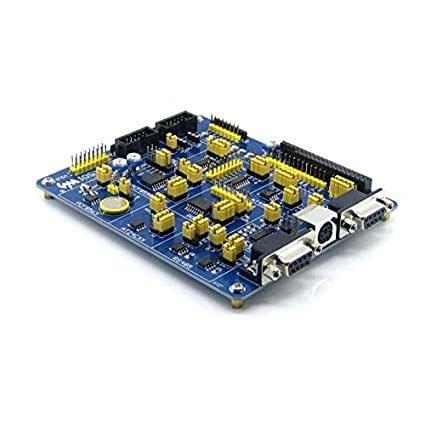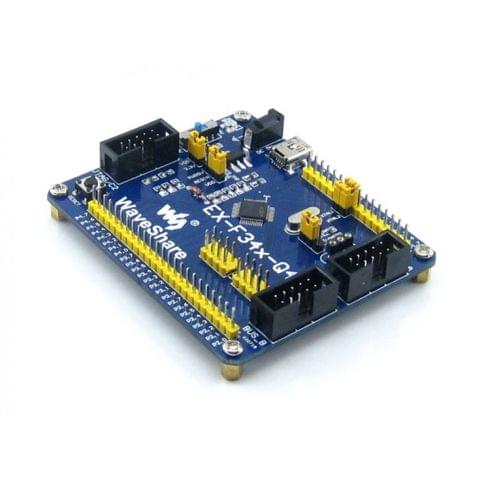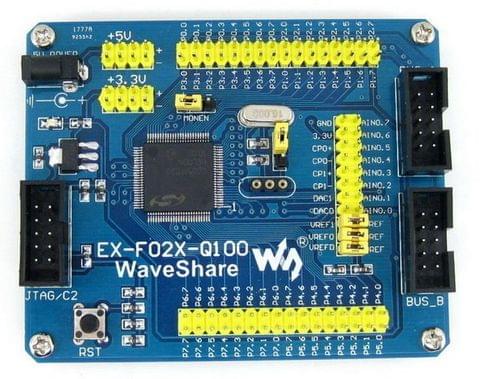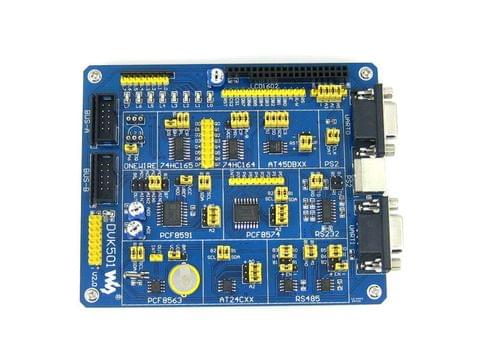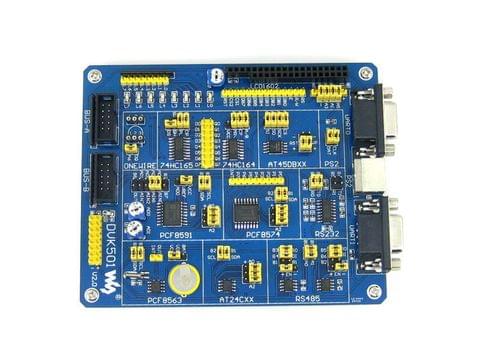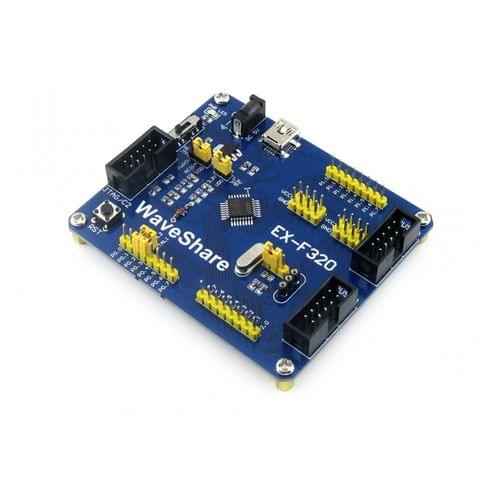-
TRANSDUCERS
- TRANSDUCERS
-
BASIC COMPONENTS DK
- BASIC COMPONENTS DK
-
MARKETPLACE
- MARKETPLACE
-
DEVELOPMENT BOARDS & KITS
- DEVELOPMENT BOARDS & KITS
-
CABLE ASSEMBLIES
- CABLE ASSEMBLIES
-
RF AND WIRELESS
- RF AND WIRELESS
-
BOXES ENCLOSURES RACKS
- BOXES ENCLOSURES RACKS
-
AUDIO PRODUCTS
- AUDIO PRODUCTS
-
ARTILA
- ARTILA
-
FANS-BLOWERS-THERMAL MANAGEMENT
- FANS-BLOWERS-THERMAL MANAGEMENT
-
WIRELESS MODULES
- WIRELESS MODULES
-
TERMINALS
- TERMINALS
-
Cables/Wires
- Cables/Wires
-
SINGLE BOARD COMPUTER
- SINGLE BOARD COMPUTER
-
BREAKOUT BOARDS
- BREAKOUT BOARDS
-
LED
- LED
-
TEST AND MEASUREMENT
- TEST AND MEASUREMENT
-
DEVELOPMENT BOARDS AND IC's
- DEVELOPMENT BOARDS AND IC's
-
EMBEDDED COMPUTERS
- EMBEDDED COMPUTERS
-
OPTOELECTRONICS
- OPTOELECTRONICS
-
INDUSTRAL AUTOMATION AND CONTROL
- INDUSTRAL AUTOMATION AND CONTROL
-
COMPUTER EQUIPMENT
- COMPUTER EQUIPMENT
-
CONNECTORS & INTERCONNECTS
- CONNECTORS & INTERCONNECTS
-
MAKER/DIY EDUCATIONAL
- MAKER/DIY EDUCATIONAL
-
TOOLS
- TOOLS
-
MOTORS/ACTUATORS/SOLEENOIDS/DRIVERS
- MOTORS/ACTUATORS/SOLEENOIDS/DRIVERS
-
FPGA HARDWARE
- FPGA HARDWARE
-
POWER SUPPLIES
- POWER SUPPLIES
-
ROBOTICS & AUTOMATION
- ROBOTICS & AUTOMATION
Description
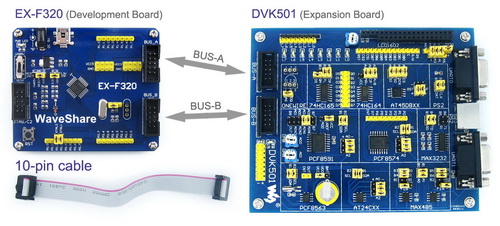
A complete starter kit and development system for the C8051F320 microcontroller. It is designed to give designers a quick start to develop code on the device.
This development system contains a main development board with the C8051F320 chip in LQFP32 package, and an additional expansion board with various peripheral devices.
The BUS-A & BUS-B headers located on both boards should be used to connect the two boards via 10-pin cables, which are delivered with the product. As shown in the figure right.
Features
EX-F320
- Power
- Powered from mini USB port or 5V DC jack, configured via on board switch
- Power input/output pin headers
- spare power input
- convenient for providing power supply to other board/device if necessary
- Onboard Chips
- C8051F320 (LQFP32), the C8051F Microcontroller
- AMS1117-3.3, on board regulator
- Interfaces
- JTAG/C2 interface for programming/debuging
- mini USB interface
- BUS-A & BUS-B, for connecting to the expansion board DVK501, ease to study/develop various peripheral devices
- Human to Machine Interface
- Reset button, used to reset the system
- Power indicator LED
- Other Features
- External crystal configurable
- there is a jumper for selecting on board 12M crystal or custom crystal mounted via the socket
- a jumper for configuring MCU pins as oscillator inputs or regular I/O pins
- All the MCU I/O pins are accessible on expansion connectors for further expansion
- All the pins are clearly marked on the PCB. These marks provide the basic information on the pins
- External crystal configurable
- Home
- DEVELOPMENT BOARDS AND IC's
- C8051F DEVELOPMENT BOARDS
- EX-F320 Premium, C8051F Development Board
EX-F320 Premium, C8051F Development Board
SIZE GUIDE
Your enquiry has been sent
Product Enquiry Form
Leave us a message for futher information.
- Shipping in 10-12 Working days
- http://cdn.storehippo.com/s/59c9e4669bd3e7c70c5f5e6c/ms.products/5d70e2538bcdd821a9311bce/images/5d70e2538bcdd821a9311bcf/5d70e20dae08605b5d2b0040/5d70e20dae08605b5d2b0040.jpg
Description of product
Description

A complete starter kit and development system for the C8051F320 microcontroller. It is designed to give designers a quick start to develop code on the device.
This development system contains a main development board with the C8051F320 chip in LQFP32 package, and an additional expansion board with various peripheral devices.
The BUS-A & BUS-B headers located on both boards should be used to connect the two boards via 10-pin cables, which are delivered with the product. As shown in the figure right.
Features
EX-F320
- Power
- Powered from mini USB port or 5V DC jack, configured via on board switch
- Power input/output pin headers
- spare power input
- convenient for providing power supply to other board/device if necessary
- Onboard Chips
- C8051F320 (LQFP32), the C8051F Microcontroller
- AMS1117-3.3, on board regulator
- Interfaces
- JTAG/C2 interface for programming/debuging
- mini USB interface
- BUS-A & BUS-B, for connecting to the expansion board DVK501, ease to study/develop various peripheral devices
- Human to Machine Interface
- Reset button, used to reset the system
- Power indicator LED
- Other Features
- External crystal configurable
- there is a jumper for selecting on board 12M crystal or custom crystal mounted via the socket
- a jumper for configuring MCU pins as oscillator inputs or regular I/O pins
- All the MCU I/O pins are accessible on expansion connectors for further expansion
- All the pins are clearly marked on the PCB. These marks provide the basic information on the pins
- External crystal configurable
Related products
NEWSLETTER
Subscribe to get Email Updates!
Thanks for subscribe.
Your response has been recorded.
INFORMATION
ACCOUNT
ADDRESS
Tenet Technetronics# 2514/U, 7th 'A' Main Road, Opp. to BBMP Swimming Pool, Hampinagar, Vijayanagar 2nd Stage.
Bangalore
Karnataka - 560104
IN
Tenet Technetronics focuses on “Simplifying Technology for Life” and has been striving to deliver the same from the day of its inception since 2007. Founded by young set of graduates with guidance from ardent professionals and academicians the company focuses on delivering high quality products to its customers at the right cost considering the support and lifelong engagement with customers. “We don’t believe in a sell and forget model “and concentrate and building relationships with customers that accelerates, enhances as well as provides excellence in their next exciting project.


